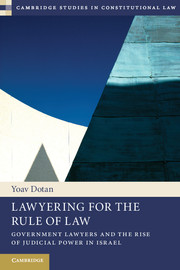Book contents
- Frontmatter
- Dedication
- Contents
- Acknowledgments
- List of figures
- List of tables
- Introduction The government’s lawyer
- 1 The Israeli legal system and the rise of judicial activism in the High Court of Justice
- 2 The High Court of Justice Department (HCJD): overview and history
- 3 Litigating for the government
- 4 The dilemma of serving two masters
- 5 Sorting things out: government lawyers in transformative litigation
- 6 The government lawyer as adjudicator: “pre-petitions” and the HCJD
- Conclusion
- Table of Cases
- Bibliography
- Index
6 - The government lawyer as adjudicator: “pre-petitions” and the HCJD
Published online by Cambridge University Press: 05 June 2014
- Frontmatter
- Dedication
- Contents
- Acknowledgments
- List of figures
- List of tables
- Introduction The government’s lawyer
- 1 The Israeli legal system and the rise of judicial activism in the High Court of Justice
- 2 The High Court of Justice Department (HCJD): overview and history
- 3 Litigating for the government
- 4 The dilemma of serving two masters
- 5 Sorting things out: government lawyers in transformative litigation
- 6 The government lawyer as adjudicator: “pre-petitions” and the HCJD
- Conclusion
- Table of Cases
- Bibliography
- Index
Summary
In the previous chapter I described the involvement of the HCJD in policy-making and institutional design. Apart from its various practices related to out-of-court settlement, organizational missions, and supervisory functions, there is one additional unusual practice that evolved within the HCJD during the 1990s. That is the function of the HCJD lawyers as the adjudicators of petitions that are issued directly to the HCJD by various petitioners. The institutional name – adopted by the HCJD itself – for such petitions is pre-petitions (PPs), and they are the subject of the current chapter.
Pre-petitions – an overview
What are pre-petitions?
A PP is a practice by which a petitioner that has a dispute with a government agency addresses the HCJD and requests the department to review their case and intervene to change the original position of the authorized agency in their favor. These petitions, such as a letter from a citizen to the department complaining about some bureaucratic illegality, are of a highly informal nature. In urgent cases, however, PPs are often issued to the HCJD by fax or even in the form of a telephone call. For example, a call by a lawyer from a civil rights organization to the head of the department concerning a dispute about the legality of a demonstration which is about to begin, or a complaint concerning an illegal arrest of an immigrant would be treated as PPs.
- Type
- Chapter
- Information
- Lawyering for the Rule of LawGovernment Lawyers and the Rise of Judicial Power in Israel, pp. 172 - 187Publisher: Cambridge University PressPrint publication year: 2013

